STATE OF THE IRISH NATION 2016
1916 Anniversary
When the rebels had been defeated in the GPO on Dublin’s O’Connell Street and the damage to the already shambles of a city was surveyed the soon-to-be martyrs were pilloried as traitors and criminals.
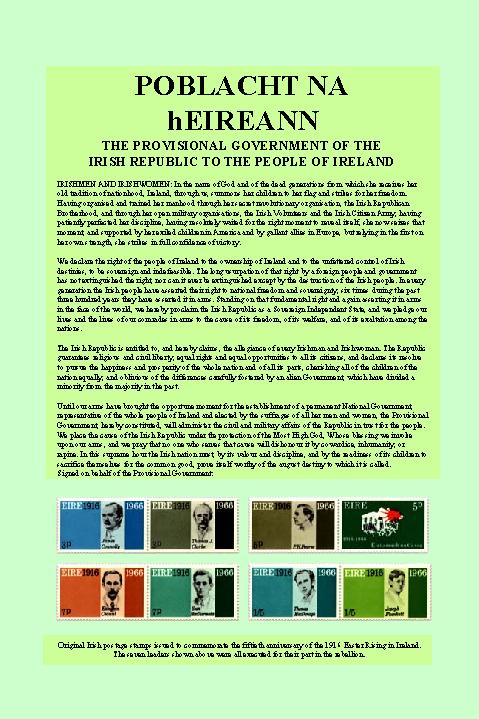
It was only after the leaders of 1916 were executed that public opinion began to turn against the ruling British regime. As has happened so often in British colonial history a military over-reaction led to a chain of events that ultimately caused that regimes downfall. The Amritsar massacre in India in 1919 turned public opinion against the British on the sub-continent and was one of the pivotal events along the road to Indian independence.
Events played out very similarly in Ireland.
The execution of Pearse and Connolly who were chief among the sixteen of the executed marked the moment when the sleeping Irish populace roused from its slumber.
The Easter Rising led directly to the war of independence championed by Michael Collins while Eamon deValera formed the first Government. A bitter civil war followed before the fledgling Irish State eventually stood on its own two feet. An Irish Republic was formally established in 1948.
What would the consequences have been for Ireland had the sixteen executed been simply imprisoned? Would the Irish have simply rebuilt Dublin and got on with the business of being under British rule? How long would it have taken for a new rebellion to occur? Would the entire island of Ireland still be under British rule today?
Of course it is impossible to know. History is written by the victors and those who even today proclaim the rebellion as an illegal and immoral act of madness are drowned out, their opinions trumped by the eventual results of the Rising.
The sacrifice made by the men and women of 1916 did indeed have profound consequences for every inhabitant of this island, and for every person who claims Irish heritage.
1916 will see a full series of events to commemorate the Rising, with plenty of comparisons between the motivations of those brave leaders and the leaders that we elect today.
The Economy
Perhaps you may have heard already? Ireland is back! Well, sort of.
Numbers rarely lie and there are numbers aplenty to shore up anecdotal evidence of a recovery in the Irish economy.
Unemployment is down from a 2012 peak of over 15% to 8.8%. The OECD has predicted that Irish GDP in 2016 will be over 4.1%, well ahead of the European average. Applications for planning permission for building projects are well up, new car sales are well up, strikes by workers are down and consumer confidence has improved greatly.
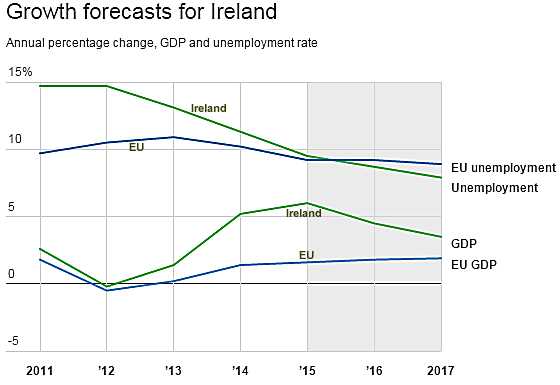
All good news.
Unless you conclude that the main reason the economy is recovering is because of the huge decline in the value of the Euro currency relative to the US dollar (greatly helping exports), and other currencies.
Or perhaps you conclude that the reduction in the cost of Oil (a major US and world economic factor) has helped the currency situation for Ireland.
Or perhaps you conclude that the only reason unemployment has dropped is because so many of the current generation have emigrated to America, Canada, Australia or beyond.
Or perhaps you consider the major threats to the Irish economy. An exit by the UK from the European Union (to be voted on later this year) would have major consequences for Ireland with no consensus on just what the cost might be. Massive immigration by EU nationals and non-EU refugees could cause a hugely expensive welfare system and an already creaking health care system to collapse.
Or perhaps you want to ignore the above and party like it is ‘Celtic Tiger’ Ireland of 1999?
We all know how that turned out.
Politics
Fine Gael enter the 1916 General Election year with the expectation of being returned to power. Rewarded by the Irish electorate for saving the country.
At least that is how Enda Kenny and his colleagues would like to view the situation.
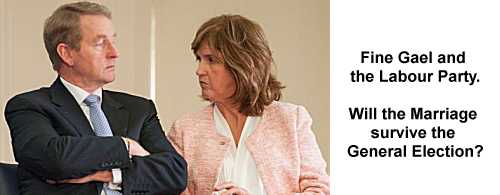
On the one hand the Fine Gael leadership continue to berate their rivals Fianna Fail for introducing policies that they claim wrecked the economy.
On the other hand these same politicians continue to implement and expand those exact same policies, hoping against hope that the Irish electorate either wont notice or wont care. All that the average punter cares about, they will reason, is money in their back pocket.
They may well be right. If recent history is anything to go by then it is clear that the Irish voter is a lot less complicated than is often assumed.
Or perhaps that philosophy of self-interest will be further demonstrated by Irish voters who could easily cause electoral mayhem by electing a whole new raft of independent ‘local-issue’ T.D.’s (members of the Irish parliament).
Truly the upcoming election is very difficult to predict.
But surely Fine Gael will be leading the next Government. It would be a sensation if they were not.
Fianna Fail hope to recover lost ground but can have no real expectation of actually being in Government after the votes are counted. Although they can hope.
Sinn Fein continue to poll well but are utterly hamstrung by their violent IRA history and connections.
The Socialist left (including the Socialist Party, People Before Profit, and a whole raft of left-wing parties) fully expect to pummel the Labour Party who were supposed to be the guardians against excessive austerity. The Labour Party is facing a severe beating.
And what of the right-wing parties you might ask?
Well you can ask. But Ireland does not have any. Not really.
Not in the liberal-hating, abortion-denying, homophobic, xenophobic, gun-toting way of being a right-wing Party. And perhaps that is a good thing. Or perhaps not.
Surely every national discourse needs some degree of balance. Some lunatic fringe that exists if only to show how clever we all are to congregate in the middle ground.
And if not a lunatic fringe then at least a well-reasoned opinion that we can either agree or disagree with. The lack of a substantial right-wing party in Ireland that actually endures is one of the mysteries of Irish political history.
So with the 1916 Anniversary events soon to be exploited for political gain by any and all-comers it truly is business as usual in ‘Ireland of the self-interest’.
Social Changes in Ireland
Of course 2015 was the year that Ireland passed the ‘same-sex marriage’ referendum. The vote was carried by 62% in favor to nearly 38% against.
Regardless of your view on this issue it is clear that there have been unintended consequences of the vote and they have nothing to do with gay marriage.
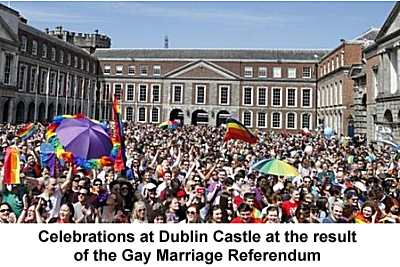
Perhaps the greatest problem with the outcome of the referendum has been the incredibly excessive smugness being demonstrated by certain sections of the Irish media who continue to proclaim the result as a victory for the entire nation. Of course, in their universe the outcome of the referendum is a big victory as they campaigned in collusion with the national print and broadcast media in favor of the vote being carried. But a victory for the entire country?
By the same logic the 1983 Abortion referendum that constitutionally banned abortion in Ireland (62% to 38%) was a victory for the entire country.
By the same logic the 2013 referendum to retain the parasitic and useless Seanad (lower house of parliament) was a victory for the entire country.
By the same logic the 2013 referendum to not lower the minimum age for the Presidency of Ireland from 35 to 21 years was a victory for the entire country.
Clearly many Irish writers and commentators are oblivious to the fact that every third voter who bothered to vote in the Gay marriage referendum was actually opposed to the introduction of the new laws.
Bigots and Homophobes, every last one!
The ease with which the concerns of the near 38% who opposed the referendum have been dismissed as belonging not just to another era of old Ireland but as being out of touch, bigoted, uninformed, unintelligent, backward, (insert demeaning word here), is truly astonishing.
Smugness is never an attractive quality in a person or group of people and yet smugness, condescension and disdain remain the constant theme of the discourse among most commentators since the gay marriage vote was passed.
The result is indeed a great triumph for those who support gay marriage (62%). For the 38% who opposed the measure (what were their reasons again?) the referendum result did not just change the Irish Constitution but also, apparently, has left them voiceless and abandoned by the well-funded and yet conceited, self-satisfied and egotistical liberal commentariat.
Ireland and Europe
The conversation in Europe will always be dominated by the economy but there are two other major issues now exercising European minds.
The massive influx of refugees into Eastern Europe and from there to Germany and Sweden in particular are causes for massive concern.
It is hard to understand just what the German (and the hence the EU) policy on immigration actually is.
By opening the doors to mostly Syrian citizens the Germans are risking more than the European economy. The terrorist attacks in Paris offer right-wing politicians a direct line between immigration and lawlessness. Rightly or wrongly they can point to a liberal immigration regime as one that will facilitate terrorism. On an economic level the policy will cause unemployment, they will argue, and on a social level it will create ghettos.
And that is not to diminish the genuine willingness and desire to help the poorest people from Syria, Africa and beyond who are exploited by soulless gangsters and military dictators.
In Ireland people want to help. They just dont want to be made a fool of. To have their own country subsumed by a culture from beyond their borders and all in the name of political correctness is liberalism gone wild.
Perhaps the feeling is the same in your country?
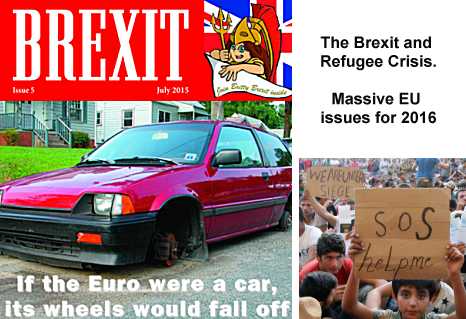
The other big issue facing Europe this year is ‘the Brexit’. The potential for the UK to leave the European Union is one that could have enormous consequences for Ireland and may even necessitate the reintroduction of the border along the six partitioned Counties in Ulster, according to Taoiseach Enda Kenny.
But as happened when the Scots were offered the chance to leave the UK but refused, it is likely that all manner of concessions will be thrown at the UK public. That carrot will quickly be followed by the stick with fear-mongering about massive financial costs being highlighted by the pro-European machine that is determined to keep the UK within the Union.
Most bookmakers have the odds of a Brexit at about 2 to 1 (or 1 occurrence of a Brexit every 3 opportunities). So they clearly think the referendum will be defeated.
Still though. You never know.
Culture
It is easy to look back on the Ireland of 1916 and regard it as the golden age of Irish literature. William Butler Yeats, Oliver St. John Gogarty, James Stephens, James Joyce and John Millington Synge were among the world-famous Irish writers of that era, the early part of the century. A wonderful golden era.
But wait! Ireland of 2016 is experiencing a new writing revolution!
Iris Murdoch, Roddy Doyle, John Banville, Anne Enright have all won the Mann Booker Prize with Seamus Heaney being awarded the Nobel Prize for Literature. These famous writers are the tip of the iceberg! Irish writing has rarely been more popular than it is today and for good reason with countless wonderful voices not named here producing truly memorable writing.

In the sporting realm Katie Taylor continues to dominate the Irish landscape while in team sports Irish soccer is on the way back with qualification for the European championships in France secured.
On the big screen Saoirse Ronan is getting rave reviews for her performance in ‘Brooklyn’ while Michael Fassbender, Colm Farrell, Liam Neeson, Gabriel Byrne, Cillian Murphy, Brendan Gleeson and Aidan Gillen are among the fine actors demonstrating that the Irish acting scene is in a very fine place.
Conclusion: The State of the Irish Nation in 2016
A century after the Easter Rising Ireland is still trying to find its true identity. Still searching for it.
The Irish of 2016 are as confusing a mix as any Irish generation that has gone before.
But perhaps just a bit too comfortable at times.
And perhaps just a bit too smug.
But after the humiliation of the last decade those that have written off the Irish had better get ready to start eating their words.

 Michael Green is Manager of The Information about Ireland Site
Michael Green is Manager of The Information about Ireland Site
Hey Michael I have been here many times but never knew there was a blog here, thoroughly enjoyed your point of view and slight sarcasm 🙂 on what a lot of others have no clue about, as soon as I saw this line “History is written by the victors” I knew from those words I would like the tone great post, I don’t see many waking up anytime soon, all the best Gerry
I enjoyed your article (and just found your website tonight). I’ve wondered how folks in Ireland felt about Kenny since his party didn’t get a strong national vote. I expect he’s no better or worse than most politicians.
Since we in the US are at the edge of the Trump cliff, Kenny doesn’t look so bad. I would like to see Ireland ban Trump’s entry the way Adams and McGuinness (& McAliskey & her daughter, probably even now) were denied entry to the US for so long. You’d have to expect a temper tantrum from Trump, but it seems that’s his reaction to everything. I don’t think most folks see that, and will not, until it’s too late.
As to your comments about votes for and against various issues, winners rarely realize how many people disagree with them until they’ve alienated the losers and many who agreed with them initially.
Enjoy your summer–you don’t want to know how hot it is in Virginia at 23:00, and it’s spring, not summer. We’ll bake til October, but I hate cold weather, so I’m happy.
I strongly relate to the Irish condition and to the plight of oppressed people everywhere. Although I am of mixed European, ambiguous ancestory, I have’nt really Identified any Irish roots yet. Noneteless I feel drawn to Ireland, its music, its culture, its plight. My father always called himself a “dumb Irishman” and he worked several years as food concessionaire / bouncer at O’Connor’s Irish bar in Philadelphia. Maybe it was just a job for him, maybe more. He wsed to say, ‘There are only two kinds of people in the world: those who are Irish, and those who wish they were.’